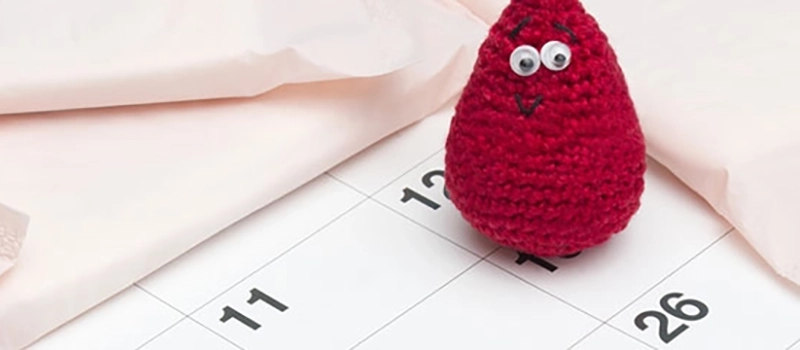
When it comes to a woman and her period, there’s definitely a trade off and this is especially true if she hasn’t had children yet. That’s because while most young women will hope to have them someday, gosh darn the monthly menstruation that indicates they’re in good reproductive health can be one heck of a nuisance. If it didn’t involve bleeding, mood swings, and irritability, then maybe it wouldn’t be so bad, but it does and that’s that. Finding blood clots during your period is normal, but there are times when they might be a cause for concern. This is especially true if you encounter large blood clots period.
Let’s discuss this in greater detail here and share what’s helpful to know about blood clots during your period and when it’s time to NOT pass them off as normal occurrences. There are some very basic and easy-to-follow guidelines for observing these clots and deciding what’s okay and what’s possibly not okay.
And, in the interest of adding a little levity to a topic that really isn’t the most pleasant of them, we’ll also spend some time talking about the GOOD aspects of a woman having her period. And that’s because despite what you may believe, there actually are some good parts to it.
Blood clots during period are also called menstrual clots. They’re gel-like globs of coagulated blood and tissue that come from a woman’s uterus as her menstruation period comes to an end. Again, it’s perfectly normal to experience them. The primary way to know if they’re a cause of concern is by the size of the blots.
If they’re small you’re usually fine. But let’s define small here; this means they’re smaller than a quarter or so in size. Any larger than this and you may want to talk to your doctor about your blood clots period.
Next, these blood clots should only occur occasionally, and in healthy females they will almost always occur nearer to the beginning of the menstrual cycle and rarely if ever be seen towards the end of it. And normal blood clots period should be a bright or dark red color. If they are brownish or have a different color to them then you should see your doctor. They may prescribe a medication like Xarelto (Rivaroxaban) or Coumadin (Warfarin).
You should also seek medical attention if you have excessively heavy menstrual bleeding, even if there are no blood clots seen in it.
A woman menstruates every month, and while women don’t need to be reminded of that it’s possible that many of them aren’t aware of exactly what’s going on in their body. What is actually occurring here is that the uterine lining is shedding, also called the endometrium. This is the body’s natural reaction to a woman not becoming pregnant, and the body not needing the thickened uterine lining without pregnancy.
But a woman’s menstrual flow isn’t entirely made up of shed endometrium. It’s also made up of blood, mucus, tissue, and blood by-products. And, again, all of this is perfectly normal and nothing that’s being expelled is anything that the body’s not capable of producing again next month.
That word may be a mouthful for you, and it’s perfectly understandable if you have no idea what it means either. To give a simple definition, to coagulate means to ‘thicken considerably’ so that the substance is now firmer and less likely to move easily. As you can then understand, blood clots during your period are when the substances that make up the menstrual flow remain coagulated.
The issue, however, is that is NOT what’s supposed to happen. As the uterine lining is shed the body releases anticoagulants whose job is to think the bloody material so that it can be flushed from the body more readily. With normal blood clots during a period, what happens is that some of the material is naturally too thick to be thinned by these anticoagulants.
Blood clots during your period are normal, but overly large and frequent blood clots during a period are not. And you know what else is definitely not normal? Finding a woman who’s very much aware of the fact that menstruation has some very specific benefits for women too.
Alright, so you’re probably now asking what exactly are they?
Well, for starters, menstruation can warn a woman about her current state of health and whether she’s at risk of disease. The color, length, and odor of menstrual blood can provide hints to her medical condition. For example, a stopped or drastically decreased menstrual cycle when not pregnant can be an indication of heart disease, diabetes, or other reproductive health issues.
And what if were to tell you that your period can actually work to improve your appearance? It’s true, and here’s how – menstruation makes your estrogen levels rise markedly, and one of the side effects of that is that is skin more glowing and radiant. Plus, it suppresses stress hormones. So, you’ll not only look better, you’ll feel better (once you get past the PMS part of it, of course)
Next, your period actually provides you with a body cleansing. Menstruation does a dynamite job of flushing out toxins that would otherwise be in your body much longer if they were to be expelled by other means. And your period gives your body the perfect opportunity to discharge excess iron. Doing so reduces the risk of cardiovascular disease.
Turning back onto our topic here today, we’re firmly in the understanding now that blood clots during period aren’t a cause for concern, but if they’re large blood clots period or are especially numerous, occur frequently, or are discolored then you should see your doctor. And if there’s one last message here it’s that it’s important to remember that menstruation means you’re in good reproductive health for when you do want to have children in the future.